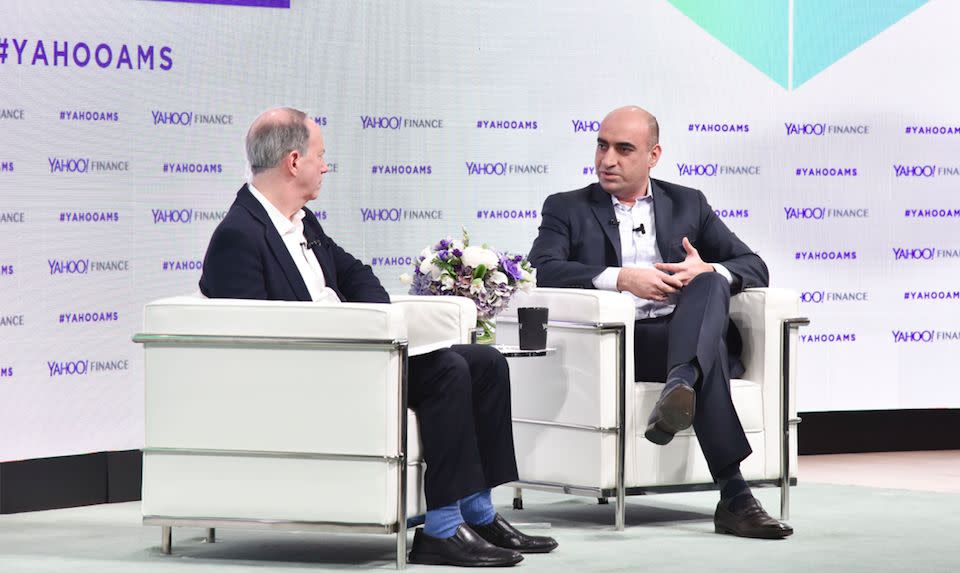JPMorgan blockchain chief: Why we launched our own cryptocurrency
JPMorgan made a surprising announcement on Thursday: it has created a cryptocurrency, JPM Coin, to facilitate “instantaneous transfer of payments between institutional accounts” for its clients.
It is the first major U.S. bank to create its own cryptocurrency.
But the news of this move, and the way it is being framed by some news outlets, may confuse consumers. To be clear: JPM Coin, for now, is only for internal use by JPMorgan’s institutional clients. Regular people cannot buy the coin as an investment. In addition, it is a “stablecoin” (though JPMorgan does not use that term in its announcement) pegged to the U.S. dollar, intended to always be worth $1.
In other words: this is a test case for JPMorgan to send payments over blockchain, reducing time and friction. The announcement explains: “When one client sends money to another over the blockchain, JPM Coins are transferred and instantaneously redeemed for the equivalent amount of U.S. dollars, reducing the typical settlement time.”
Ripple, the company behind the cryptocurrency XRP, has a similar use case: faster bank settlements using blockchain. But Ripple CEO Brad Garlinghouse criticized JPM Coin in a tweet on Thursday: “As predicted, banks are changing their tune on crypto. But this JPM project misses the point – introducing a closed network today is like launching AOL after Netscape’s IPO. 2 years later, and bank coins still aren’t the answer.”
And of course, much of the immediate reaction people are having to this news is to point out that JPMorgan CEO Jamie Dimon, only two years ago, called bitcoin a “fraud.” Last year, he walked those comments back, saying he regretted it.
So, is the launch of JPM Coin a direct contradiction to Dimon’s infamous comments? A spokesperson for JPMorgan says no: “I think Jamie has been more consistent than people give him credit for. He’s always separated cryptocurrency from the underlying value and the use of blockchain.”
JPMorgan clearly sought to address Dimon’s old comments head-on with a section in its announcement that asks, “What is JPMorgan’s official stance on cryptocurrencies?” The company’s answer: “We have always believed in the potential of blockchain technology and we are supportive of cryptocurrencies as long as they are properly controlled and regulated. As a globally regulated bank, we believe we have a unique opportunity to develop the capability in a responsible way with the oversight of our regulators.”
For more clarity on the news, Yahoo Finance spoke by phone with JPMorgan head of blockchain Umar Farooq. He calls JPM Coin an “endorsement” of JPMorgan’s belief in blockchain, and he draws a distinction between the bank’s attitude toward blockchain and its attitude toward cryptocurrencies.
What follows is an edited transcript.

Yahoo Finance: This is a stablecoin, right? But JPM isn’t using that term in its announcement.
Umar Farooq: It is definitely closer to a stablecoin than a general cryptocurrency. But the reason we kept that distinction was, some of the other stablecoins such as USDC, anyone can own them and trade them. But in our case, the JPM Coin can only be held or traded by JPM clients. It is essentially only for wholesale clients of JPM.
Obviously, from what Jamie Dimon has said in the past, I have to ask about JPM’s thinking on the crypto space in general.
We’ve always been very bullish on blockchain but also very cautious. We don’t believe it’s a solution to all the world’s problems. And I think that’s where the hype cycle comes in. We’ve already developed solutions in blockchain tech, and we’ve had some of those go out there. More than 170 global banks have signed up for our Interbank Information Network blockchain program.
We needed ways to actually move value on blockchain, and without JPM Coin we couldn’t do that. So I would say this is a complementary product to our other blockchain products.
Had JPM clients really been asking for this, or JPM wanted to try it out anyway?
Yes, some of our clients had said, ‘Hey it would be great to have something built by JPM to move value over a blockchain.’ At the end of the day we are doing this for our clients, so this is in response to them.
But there is a little bit of the response you mentioned, people saying they want to buy the cryptocurrency. This is not meant to be an instrument like what they might compare it to.
So if this is just for internal use right now, what can people take away from the launch, what does it symbolize?
I think this is an endorsement of the fact that we continue to believe blockchain is the future. But this is a nascent technology, still developing, so I don’t think you’re going to see dramatic changes in the next 12 months.
—
Daniel Roberts covers bitcoin and blockchain at Yahoo Finance. Follow him on Twitter at @readDanwrite.
Read more:
CoinList cofounder: Crypto will be 'quiet' in 2019
Crypto pioneer Jed McCaleb: 'Most financial institutions are not going to use bitcoin'
Exclusive: SEC quietly widens its crackdown on ICOs
What crypto investment firms are telling clients during a bear market

 Yahoo Finance
Yahoo Finance 
